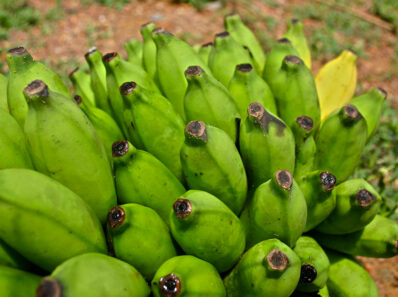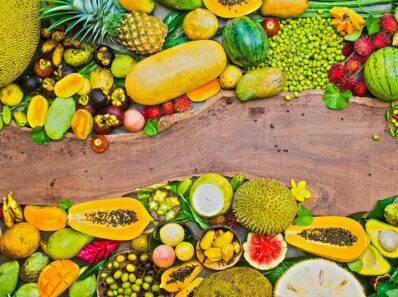Articel from Sunday Observer 18. March 2018 by Carol Aloysius
Move out expired, outdated and unhygienic foods with their trail of tummy aches and diarrhoea. Move in imported apples, grapes and oranges minus their original vitamin C and laced with pesticides. The latter, to quote the latest findings by the Government Analyst Department, lead to much more dangerous health consequences than a mere puffy stomach caused by expired unhygienic food.
Currently, trending as the hottest news in town, the public disclosure by the Government Analyst Department (Saturday March 3,) that fifty percent of test samples of oranges, apples and grapes collected from our local markets contained pesticides, no doubt shocked Sri Lankan fruit lovers. Long used to passively accepting that anything imported is more superior to anything locally grown, the news jolted them to the grim reality that most imported fruits contained harmful chemicals that could in fact poison them and their children .
According to a statement by the The Director General A. Weliangage, apples, grapes and oranges contained a pesticide known as ‘Chlorpyrifos’, while thirty percent of the grape samples tested had contained an insecticide known as, ‘Profenofos’ .
Open secret
The disclosure no doubt came as a rude shock to consumers who had till now fondly pinned their faith on the safety precautions and assurances by countries of their origin, little realizing that adulteration and exposure to illegal chemicals was always a strong possibility as the fruits made their way crossing the Atlantic Ocean and then the Indian Ocean, to reach our little paradise island.
Is this something new? we asked former Head of the Poisons Information Unit, National Hospital Sri Lanka, Expert Advisor WHO (SEARO ), Dr Waruna Gunathilake.
“Not really. In fact, it is an open secret which has more or less been known to all of us for a long time”, he told the Sunday Observer.
“ All those of us who consume these fruits have been informed by the Ministry of Health to be cautious when buying them as there had been complaints they could be contaminated with chemicals. Unfortunately, these warnings seem to have fallen on deaf ears. What is more disturbing is that due to the high prices of these imported fruits, many parents buy these, mostly for their children.
This poses an even more dangerous health hazard, since young children are still growing and their immune systems and brain functioning powers are still developing.
Eating fruits laced with Chlorpyrifos and Profeneofos can impair the function of the brain and cause cognitive disfunction i.e. interfere with the rational, logical thinking pattern and IQ development of the brain.”
Young children and pregnant women whose foetuses can carry abnormalities in the long run,” he said. “ Because of their long term effects it means there will be negative impacts on the health of our future citizens”, he added.
Guidelines
Responding to our question on whether the World Health Organization and Food and Agricultural Organization had set some guidelines on the levels of pesticides to be used, he said, “They have set guidelines on the maximum tolerable pesticide residual levels in food items in general, and stated that only if they exceed these levels would they become poisonous. However, this scientific concept is recently being challenged , he noted.
On what grounds?
“The new concept is that toxins are toxins however small or minute the quantity.
To allow even a tiny quantity of these toxic pesticides and insecticides to enter the blood stream of an unborn foetus or a young child whose brain is still developing, can in the long term be disastrous health wise.”
Public Health Inspector (media) Gemunu Saliya agrees.
Speaking on behalf of the PHIs who collected the samples and handed them for testing to the Government Analyst Dept, he said, the PHIs had personally visited several markets and supermarkets where they collected the three types of fruits, apples, oranges and grapes for sample testing.
“It was not a routine test like the ones we usually carry out. It was a special request from the Health Department Director .
He said, both pesticides had been banned and therefore the fruits containing them would have been smuggled illegally.
No legal procedure
“Unfortunately, the import of fruits into this country is still not banned. We can only hope the Health Ministry will come to a decision on this soon, for the sake of the health of our future citizens as all of us want a healthy nation.” Referring to the Food Act of 1989, he noted that there was a clause already existing that fruits should be free of pesticides. He further lamented that even when tests proved that a certain fruit contained toxins, a report was needed from the Government Analyst Department. “Unfortunately, there does not seem to be any legal procedure for this “, he said.
So what is the solution?
Dr Waruna has three ways to solve the tricky situation.
“ First, since these samples were collected from local markets, let the public know from which market and where in the country they were collected. As consumers, they have a right to this information so that when they purchase a fruit from any of the markets named, they would be making an informed choice. Give them the right to track them.”
But, how is that possible when there are so many markets spread out islandwide?
“Tell them to look at the Code and from these they can find out the expiry date, address of the farmer, etc.”
Can the country from where the fruit was originally dispatched be also tracked in the same way? We wondered.
“Yes . Every country, before dispatching a food item has a code number for each batch that is released. From that it is possible to track not only the country of origin, but the farmers and farms where they were grown “. The second way to resolve the problem was to test these fruits at the entry points to the country, like the airport, harbour, etc before they reached the open market, by which time they could be subject to various illegal processes and toxins.
The third way to solve the problem was by carefully monitoring them once they were in the open market. “Open market surveillance is vital. It should be a sustained effort by the public, the PHIs and the Health Ministry”, he emphasized.
He did not stop there. Challenging the continued import of expensive fruits like apples, grapes and oranges, he asked a pertinent question:
“For whose benefit are they being imported? Certainly not for any health benefits because none of them contain Vitamin C as they claim to have , since they are preserved fruits that have lost any of their original vitamins due to the long journey they have made by sea or air. In my opinion, it is an utter waste of our precious foreign exchange.”
Promote local fruits
“We could have saved all this needless waste of foreign exchange by simply promoting our own local fruits which are plentiful in this country. Besides being fresh and healthier they also have the necessary vitamins we need. Buy seasonal fruits which are cheaper and fresher”, he advised, as a useful tip to readers.
PHI Gemunu Saliya told the Sunday Observer that copies in all three languages of the report by the Government Analyst Department with regard to the samples of fruits sent for testing and their findings were now available, and could be accessed by the public.
For more information contact him on 0728285553 Dr Waruna can be contacted on 2691111 We welcome readers’ views on this subject
Source: https://www.sundayobserver.lk/2018/03/18/features/are-fruits-we-eat-poisoning-us







